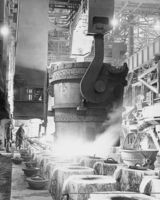 | Back to e-WV
| Back to e-WV
 The West Virginia Encyclopedia
The West Virginia Encyclopedia
 | Back to e-WV
| Back to e-WV
 The West Virginia Encyclopedia
The West Virginia Encyclopedia

Industrialist Ernest T. Weir (1875–1957), who was born in Pittsburgh and died there, founded Phillips Sheet & Tin Plate in Clarksburg, West Virginia, in 1905 with J. A. Phillips. After the death of Phillips, Weir moved the company to a farm just north of the village of Hollidays Cove in southern Hancock County, the site of present Weirton. On August 1, 1918, Weir’s 43rd birthday, the company was renamed Weirton Steel Company.
Weir created an integrated steel mill that became West Virginia’s largest employer, the state’s largest taxpayer, and the world’s largest tin plate producer. He created a town around his mill, and for years his Weirton Improvement Company provided Weirton’s sewers, water service, garbage pickup, and other municipal services. In 1927, he took over as the chief executive officer of National Steel, of which Weirton Steel formed the keystone. In the 1930s, Weir defied Franklin Roosevelt’s National Recovery Administration and National Labor Relations Board and kept national unions from organizing his mills.
Weirton Steel joined in the national recovery following the Great Depression Depression. It converted to wartime production during World War II, producing howitzer shells and other munitions and contributing to the atom bomb project. The company shared the steel industry prosperity of the post-war years, but began to suffer the effects of foreign competition by the 1960s. Weirton modernized production during the decade but lagged behind European and Japanese producers in this regard.
During the 1970s, the American steel industry fell upon depressed times. On March 2, 1982, National Steel announced that subsidiary Weirton Steel would close unless a buyer came forward. When no corporate buyer materialized, Weirton steelworkers undertook a campaign to purchase the plant under an Employee Stock Ownership Plan or ESOP. Various constituent groups, political leaders, management, and labor joined in the innovative effort.
A plan was developed by which Weirton Steel bought the plant and its raw materials and inventory from National Steel. In September 1983, Weirton’s workers approved the deal by a margin of seven to one, and in January 1984 ownership was transferred to the employees. Under the plan, the workers gave back 32 percent of their wages. All pensions before 1982 remained the responsibility of National; all property reverted to Weirton; and National was to receive $66 million over 15 years. What was lost in the wage giveback was later made up in profit-sharing for workers.
The rest of the 1980s were profitable years for the ESOP, and employees reaped many financial benefits. In 1989, to raise more money for continued capital improvements, Weirton Steel stock began trading on the New York Stock Exchange, despite the strident objections of many ESOP members.
Making the company public did not improve the company’s bottom line, and throughout the 1990s, employment continued to fall as overseas competition adversely affected all American steel companies. Although the Weirton ESOP remained the largest of its kind in the United States, employment hit a 70-year low as the 21st century began.
In 2003, still the fifth largest private employer in West Virginia, Weirton Steel, nevertheless, entered into bankruptcy. International Steel Group (ISG) purchased the plant in 2004 and then sold it to Mittal Steel, now ArcelorMittal, in 2005. Employment at ArcelorMittal Weirton (now a subsidiary of Cleveland-Cliffs Inc.) continued to decline. Still, Cliff’s Weirton site remained the world’s largest tin plate producer, despite having no hot metal operations. The extant parts of the mill receive coils from the corporation’s other American operation and clean and coat them. In the early 2020s, the company invested about $50 million in the Weirton site and, by 2022, was West Virginia’s 51st largest private employer. However, due to competition from underpriced imports, Cleveland-Cliffs announced in May 2023 it would lay off approximately 300 employees, about one-third of its work force in the city. In February 2024, the company announced that in April, it would close the Weirton plant entirely, laying off some 900 employees. The decision came a week after the International Trade Commission removed a year-old tariff on Canada, China, Germany, and South Korea for “dumping”—selling or trading at below-market prices—tin and chromium-coated sheet steel products in the United States. The commission determined that the underpriced products had little financial impact on those same items produced in the United States.
Parts of the former steel giant, including the open hearth, blooming mill, quality control lab, and research and development structures, have been razed. A site on Weirton Heights was cleared to make way for a new Walmart, which is now one of West Virginia’s largest private employers.
In December 2022, the state of West Virginia announced a partnership with Form Energy to build a new 55-acre iron-air battery factory on a portion of the former Weirton Steel grounds. The $760 million project, which broke ground in May 2023, is projected to create 750 full-time jobs. In July 2024, Cleveland-Cliffs announced it would construct an electrical distribution transformer production plant at Weirton. The transformers are essential for maintaining and modernizing the nation’s electrical grid.
Written by David T. Javersak
Lieber, James B. Friendly Takeover: How an Employee Buyout Saved a Steel Town. New York: Viking, 1995.
Ubinger, John D. Western Pennsylvania Historical Magazine. (July 1975).
Layoffs Coming to Cleveland-Cliffs in Weirton. The Weirton Daily Times, May 13, 2023.